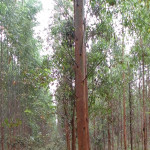The International Campaign to STOP GE Trees urges the Brazilian government and CTNBio to refuse Futuragene’s request to plant GE trees in Brazil.
The Campaign to STOP GE Trees, including Biofuelwatch, Canadian Biotechnology Action Network, Global Justice Ecology Project, Indigenous Environmental Network, World Rainforest Movement, released the following statement in support of the “Open Letter to CTNBio”: The Campaign to Stop GE Trees, an international coalition founded in 2004, supports a global ban on commercial deregulation of genetically engineered trees (also known as genetically modified trees) based on serious concerns about their impacts on biodiversity and human rights. The Campaign supports the position expressed herein, in solidarity with the “Open Letter to CTNBio” from Brazilian and Latin American groups, that calls upon CTNBio to reject the request by the Futuragene corporation for commercial approval of GE trees in Brazil.
The Campaign is joined by 140 organizations from 35 countries/regions that endorse the call for a global ban on the release of genetically engineered trees into the environment, as well as those scientists and organizations that are calling for a moratorium on the release of GE trees until they are proven to have no damaging social or ecological impacts. As no such proof of safety currently exists, but there is significant evidence to the contrary, the release of GE trees must be stopped.
It is, for example, well-documented that increasing the growth rates of plantation trees (as Suzano has done with their genetically engineered eucalyptus trees) results in the rapid expansion of plantations, not the opposite. According to the UN Food and Agriculture Organization between the years 1990 and 2010, the average yield of wood from plantations doubled, yet the amount of land occupied by those plantations increased over 60% from 97 million to 153 million hectares.
[http://www.fao.org/docrep/013/i1757e/i1757e.pdf, Table 5.5, page 94]
Additionally, in 2008, the UN Convention on Biological Diversity, to which Brazil is a signatory, called for the application of the Precautionary Approach regarding GE trees, and a comprehensive and transparent assessment of their long-term social and ecological risks prior to any open release into the environment. If CTN Bio approves the commercialization of the GE eucalyptus in question, this decision would directly contravene decision IX/5(1) of the UN Convention on Biological Diversity. <http://www.cbd.int/decision/cop/?id=11648>
The Conference of the Parties, Urges Parties to:
(r) Reaffirm the need to take a precautionary approach when addressing the issue of genetically modified trees;
(s) Authorize the release of genetically modified trees only after completion of studies in containment, including in greenhouse and confined field trials, in accordance with national legislation where existent, addressing long–term effects as well as thorough, comprehensive, science-based and transparent risk assessments to avoid possible negative environmental impacts on forest biological diversity; [1]/
(t) Also consider the potential socio-economic impacts of genetically modified trees as well as their potential impact on the livelihoods of indigenous and local communities;
(u) Acknowledge the entitlement of Parties, in accordance with their domestic legislation, to suspend the release of genetically modified trees, in particular where risk assessment so advises or where adequate capacities to undertake such assessment is not available;
(v) Further engage to develop risk-assessment criteria specifically for genetically modified trees;
(w) Note the results of the Norway – Canada Workshops on Risk Assessment for emerging applications for Living Modified Organisms (UNEP/CBD/BS/COP-MOP/4/INF/13);
(x) Welcome the decision of the fourth meeting of the Conference of the Parties serving as the meeting of the Parties to the Cartagena Protocol to establish an Ad Hoc Technical Expert Group on Risk Assessment and Risk Management that is also mandated to address the issue of genetically modified trees;
(y) Collaborate with relevant organizations on guidance for risk assessment of genetically modified trees and guidance addressing potential negative and positive environmental and socio – economic impacts on the conservation and sustainable use of forest biodiversity associated with the use of genetically modified trees;
(z) Provide the available information and the scientific evidence regarding the overall effects of genetically modified trees on the conservation and sustainable use of biological diversity to the Executive Secretary for dissemination through the clearing-house mechanism;
[1]/ Where applicable, risks such as cross-pollination and spreading of seeds should be specifically addressed.
We therefore support the call to CTNBio and the Brazilian government made by Brazilian and Latin American groups to reject the application of Futuragene to commercially plant genetically engineered eucalyptus trees.
Signed:
The Campaign to STOP GE Trees (International)
Biofuelwatch (US, UK)
Canadian Biotechnology Action Network (Canada)
EcoNexus (Europe, UK)
Global Justice Ecology Project (US)
Indigenous Environmental Network (North America)
World Rainforest Movement
Additional Sign ons:
Agricultural Missions, Inc (AMI),ALDW Enterprises, Allergy & Asthma Research Centre, Kolkata, Alliance for Global Justice, Alliance for Humane Biotechnology, anti-GMO committee of the Cyprus Federation of Environmental Organizations, Anti-Biomass Incineration Campaign/Energy Justice Network, ASEED Europe, Azafady, Babes Against Biotech, Bangladesh Krishok Federation, Barnard-Boecker Centre Foundation, Beyond Copenhagen Collective, BiofuelwatchBUND – Friends of the Earth Germany, Burning Books, Caerhys Organic Community Agriculture, Caney Fork Headwaters Association, Canopy, Capital R Consulting, LLC, Carbon Trade Watch, CEEweb for Biodiversity, Center for Biological Diversity, Center for Food Safety, Centre for Community Economics and Development Consultants Society (CECOEDECON), College of Medicine, University of Illinois, Consumers’ Association of Penang (CAP), Cornucopia Network/NJ/TN Chapter, Corporate Europe Observatory (CEO), CSALT Citizens Seeking Alternatives to Log Terminals, Cumberland Countians for Ecojustice, Dogwood Alliance, Earthcare Books, EcoC2S (EcoCsquaredS), Ecological Farmers of Ontario, Ecological Society of the Philippines, Ecologistas en Accion, Environmental Paper Network, Environmental Rights Action/Friends of the Earth Nigeria, Essential Ecology, Everglades Earth First!, Fair World Project, FDCL Forschungs-und Dokumentationszentrum Chile-Lateinamerika e.VFédération SEPANSO Aquitaine, FERN, Find Your Feet, Food & Water Europe, Food & Water Watch, Food First/Institute for Food and Development Policy, Forest Peoples Programme, ForestETHics, Forum Ökologie & Papier, Friends of the Earth Europe, Friends of the Earth Spain, Friends of the Earth Sweden, Friends of the Siberian Forests, Gen-ethical Network, Genetic Engineering Network (GEN), GeneWatch UK, Gestos-HIV, Comunicação e Gênero, Global Forest Coalition/CCRI, Global GMO Free Coalition, Global Health Network, GMO Free Oregon, GMO Free USA, GMO Free Windsor, GMO-Free Oahu, GMWatch, Green Party of the US, Grupo AgrOrganico GAO, Hnutí DUHA – Friends of the Earth Czech Republic, House of Grace, IBON International, Independent Consultancy on Women’s Rights, Institute for Responsible Technology, Institute for Social Ecology, International Tribal Association, J & J Enterprise, Just Forests, KONPHALINDO, Labour, Health and Human Rights Development Centre, Land Workers Alliance, Lane County Energy Round-Up, MADGE, Mangrove Action Project (MAP), Markinch, Massachusetts Forest Watch, Network for Environmental & Economic Responsibility Of United Church of Christ, NGO Ecosouthwest, Nicaragua Network, Nourish, Scotland, Nourishing Generations Educational Project, Núcleo de Aveiro da Quercus – ANCN, Ogiek People Development Program(OPDP), Ole Siosiomaga Society Incorporated (OLSSI), Organic Consumers Association, Our Forests, OurGreenChallenge.org, PAIRVI, PAN Europe, Partner Suedmexikos e.V. , PESTICIDE ACTION NETWORK ASIA AND THE PACIFIC (PAN AP), Pesticide Action Network North America, Plataforma ANdalucía Libre de Transgénicos, Quercus – Associação Nacional de Conservação da Natureza, Rainforest Relief, REAL Cooperative, Red de Accion por los Derechos Ambientales (RADA), Red de Semillas, “Resembradno e Intercambiando”, REDD Monitor, Reforest the Earth, RENICC, Rettet den Regenwald e.V. (Rainforest Rescue), Robin Wood, Rochester Committee on Latin America, Roots for Equity, Russian Academy of Sciences, Sacramento Label GMOs, Sahabat Alam (Friends’ of the Earth) Malaysia, Salva La Selva, Save America’s Forests, Sierra Club, South Florida Audubon Society, Standing Together to Outlaw Pesticides, Stockholm International Water Institute, Sunray Harvesters, Support for Women in Agriculture in Agriculture (SWAGEN), The Aurora Foundation, The Blue Planet Project, The Corner House, The Council of Canadians, The Haiku Aina Permaculture Initiative, Third World Network, University of Kassel, Washington Biotechnology Action Coalition, World Family, World Temperate Rainforest Network, Yôko Woldering, KoBra e.V.Zelenyi Svit / Friends of the Earth UkraineÈ

